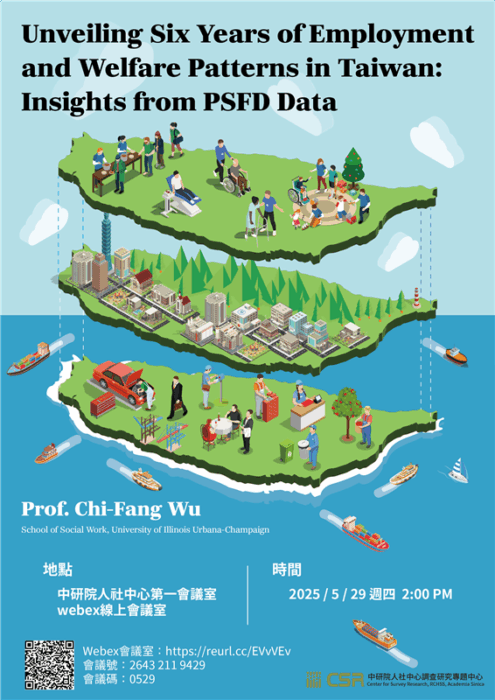【專題演講】Unveiling Six Years of Employment and Welfare Patterns in Taiwan: Insights from PSFD Data

講題:Unveiling Six Years of Employment and Welfare Patterns in Taiwan: Insights from PSFD Data
講者:Prof. Chi-Fang Wu(吳季芳教授)/ School of Social Work, University of Illinois Urbana-Champaign
時間:2025 / 5 / 29 週四 2:00 PM
地點:中研院人社中心第一會議室 & webex線上會議室
Webex會議室:https://reurl.cc/EVvVEv
會議號:2643 211 9429
會議碼:0529
摘要:
Background and Purpose: Limited research has explored long-term employment trajectories and their relationship with social welfare participation. This study uses six-year longitudinal data to (1) examine employment patterns and trajectories, (2) identify longitudinal patterns and cluster groups of social safety net program participation, and (3) analyze the relationship between employment patterns and social welfare participation among Taiwanese workers. The results have implications for targeting social welfare programs to enhance the economic well-being of low-income households.
Methods: Using four waves (2016, 2018, 2020, 2022) of the Panel Study of Family Dynamics (PSFD), we analyzed household heads aged 18-64 with at least one child under 18 at baseline (N=1,912). Employment trajectories were classified into four groups: consistently full-time employed, unstably employed, consistently part-time employed, and consistently unemployed. Five social welfare programs were included. Descriptive statistics, latent class analysis, and multinomial logistic regression were used.
Results: 63.2% were consistently employed full-time, 8.9% part-time, and 14.6% unemployed. Females, older individuals, and those without a college degree were more likely to experience unstable or part-time employment. Consistently employed individuals received more universal program benefits, while consistently unemployed individuals had higher participation rates in both universal and medical/disability assistance programs. Latent class analysis identified three welfare participation patterns: Multiple Assistance, Child Assistance, and No Benefit. The findings indicate that people with different employment trajectories have varying needs for social welfare subsidies. A high proportion of part-time workers did not receive any social welfare benefits.
Discussion & Conclusion: Four employment trajectories were identified. Consistently non-employed individuals tend to be older, female, less educated, and have lower incomes. The study highlights the need for targeted welfare programs to support those in unstable employment and address gaps in the welfare system. Promoting employment stability is crucial for reducing reliance on welfare programs and enhancing economic security and family well-being. The findings contribute to a deeper understanding of social welfare participation and underscore the critical role of welfare programs in supporting households with children, offering valuable insights into designing a more comprehensive and accessible social security system in Taiwan.
主辦單位:中研院人社中心調查研究專題中心
聯絡人: 謝小姐